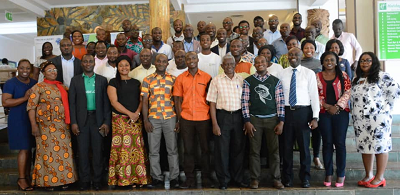
Stakeholders in WASH calls for effective private sector involvement
Stakeholders in the Water, Sanitation and Hygiene (WASH) sector have called for effective private sector involvement in sanitation service delivery.
They made the call at a National Private Sector Engagement forum organised by Voice for Change Partnership (V4CP) Water, Sanitation and Hygiene (V4CP WASH) Civil society organisations (CSOs), with support from SNV Ghana, a non-governmental organisation under the Voice for Change in Accra.
The forum was themed, “Creating an enabling environment for private sector participation in sanitation service delivery”.
The various speakers at the event called for effective private sector involvement in sanitation service delivery.
Sanitation must be seen as
Speaking at the forum, the Country Programme Coordinator of SNV, Mr Eric Banye said sanitation services must be approached as a business but it should be affordable enough for everyone to access it.
He mentioned that discussions on Public-Private Partnerships (PPP) had been rife in ensuring access to sustainable sanitation, a new concept gradually shifting from sole dependence on the government to increased private sector involvement and building business models around social interventions.
On her part, the Executive Secretary of Environmental Service Providers Association, Madam Ama Ofori Antwi said the waste management sector had created 6,000 formal sector employment jobs and 60,000 jobs for the informal sector.
She noted that the private sector had taken leadership in terms of promoting environmental sanitation and clean environment, with value addition innovations.
Madam Antwi called for reform in policies and clear guidelines outlined for private sector involvement during the process, saying “the government must lead and provide a framework for the private sector to make it attractive for investors.”
The Programmes Manager at the Ministry of Sanitation and Water Resources, Mrs Esi Boni-Morkla, noted that increasing access to improved sanitation, combined with hygiene, was also part of the five global public health strategies for control and elimination of neglected tropical diseases.
She cited inadequate financing mechanism, weak research support, lack of a database, unwillingness and inability to pay for services, lack of land, high open defecation and
Collaboration
Nore Ollennu of Intervention Forum (IF) said there was the need for an effective collaboration between the government and financial institutions to provide targeted financing for sanitation projects at special interest rates for private investors and individual households.
“Also there is a need for effective monitoring systems to ensure funds are used for their intended purpose,” she said.
She also urged the Private Sector to invest in research to unearth latrine technologies that can effectively manage faecal sludge at the household level between the periods of 10-15yrs at an affordable rate to low-income households.
She also called on the Ministry of Sanitation to develop a costing tool as a basis to determine financing needs to help deliver the SDG 6.